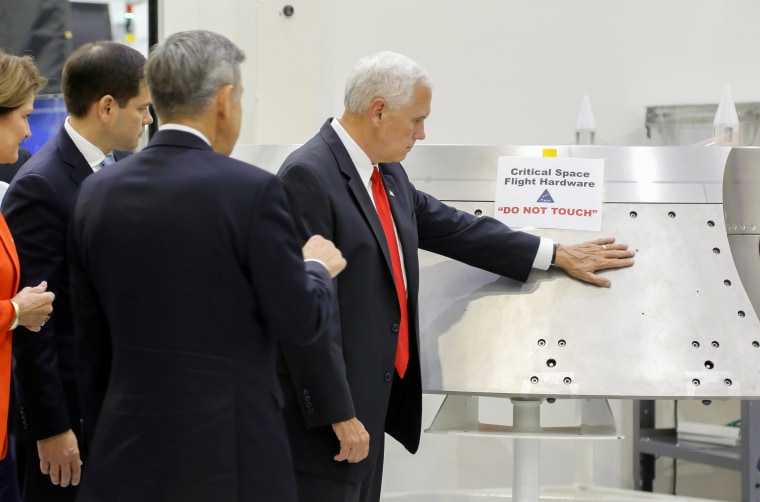One of the unfortunate staples of Donald Trump's presidency is that officials in the president's orbit feel compelled to take some of his ridiculous ideas seriously, using them as the basis for actual policy initiatives.
Trump made up a story about millions of illegal ballots being cast in 2016, which was fantasy, but which nevertheless led to the creation of an actual commission on election integrity. More recently, the president convinced himself that first responders in California lack the water they need to combat wildfire, and despite that being completely wrong, administration officials adopted new, real-world policies to accommodate Trump's confusion.
And the president has also said he thinks it'd be cool if the United States had a Space Force, all of which led to yesterday.
Vice President Mike Pence on Thursday laid out details for President Donald Trump's proposed new branch of the U.S. military -- responsible for protecting national security in outer space.In a speech at the Pentagon, Pence said the new Space Force would be established by 2020.... If it happens, the Space Force would become the sixth branch of the U.S. Armed Forces, equal to the other five, Pence said.The Department of Defense released a 15-page report Thursday laying out the phases of creating the new branch, which will ultimately need to be approved by Congress.
Sounding very much like an excited kid, Trump tweeted after the vice president's speech, "Space Force all the way!"
Trump's re-election campaign then sent a fundraising appeal to supporters, asking them to vote on their choice for a Space Logo. (One of them is effectively identical to the official NASA logo, but in a different color.)
It's tempting not to take any of this seriously. The trouble is, the Trump administration is now taking the idea very seriously. Indeed, Pence called for the United States to spend $8 billion on the Space Force endeavor.
There's no shortage of questions that have no answers. We don't know, for example, how the administration intends to overcome congressional opposition to creating another military branch. We don't know the degree to which this endeavor may conflict with existing U.S. treaty obligations. We don't know why the White House is ignoring the Pentagon, which is reportedly quite skeptical of the idea.
And as the Washington Post's Robert Costa noted, we also don't know which private-sector entities "stand to profit from a major military expansion into space." (One wonders whether some of these companies' executives are members at Mar-a-Lago.)
We do know, however, that Trump thinks "Space Force" sounds cool, which is why it's become a routine applause line in each of the president's recent campaign rallies.
But what's often lost in the conversation is the fact that the idea, by the president's own admission, started as an offhand joke. Trump said in March, describing a conversation with White House staff, "You know, I was saying it the other day, because we are doing a tremendous amount of work in space. I said, 'Maybe we need a new force. We'll call it Space Force." And I was not really serious. Then I said. 'What a great idea. Maybe we'll have to do that.'"
Five months later, the idea Trump was "not really serious" about has become an $8 billion proposal.
